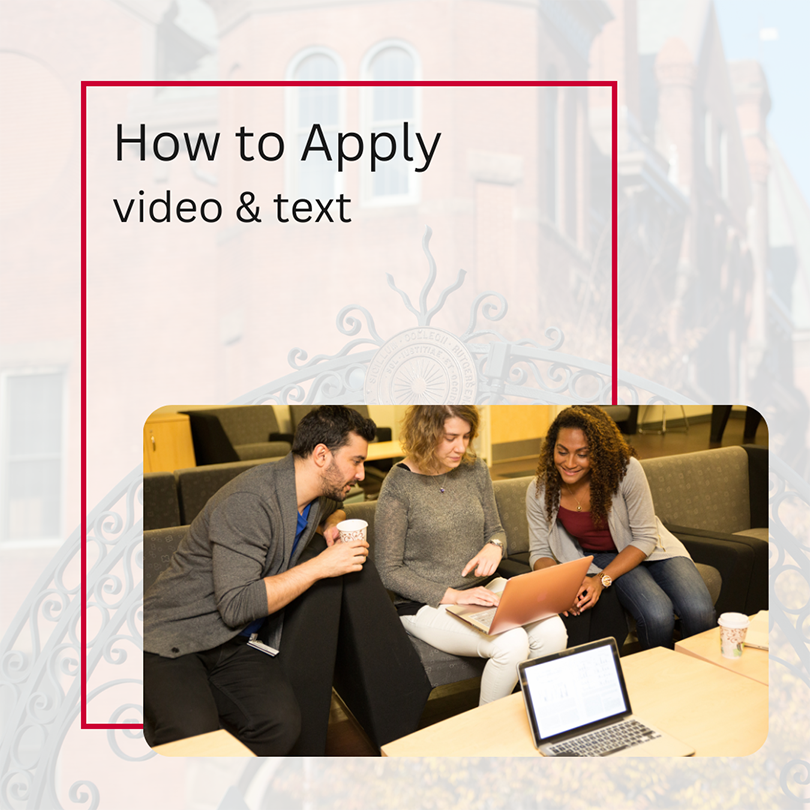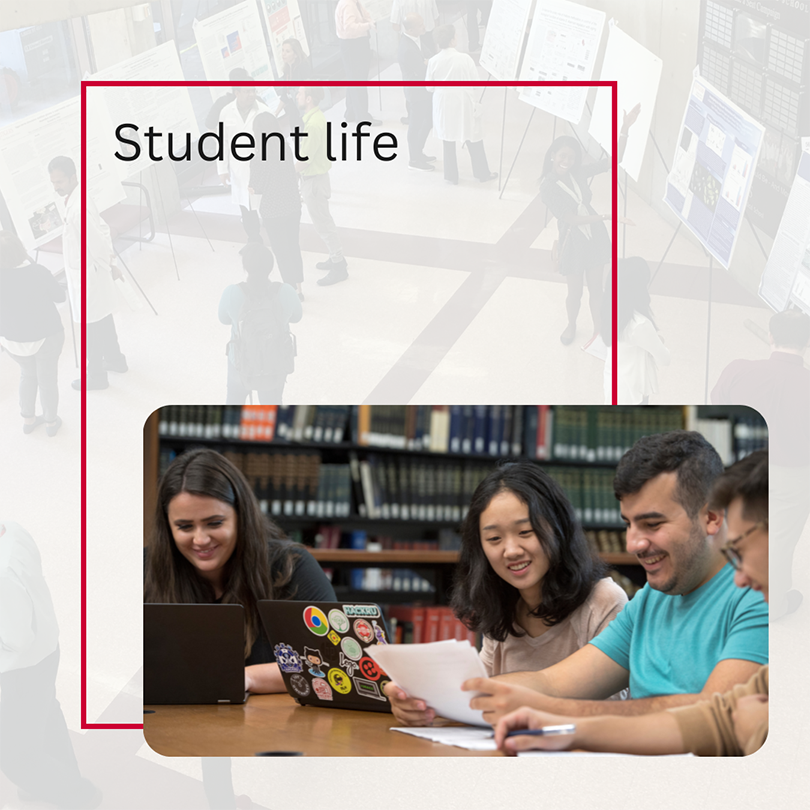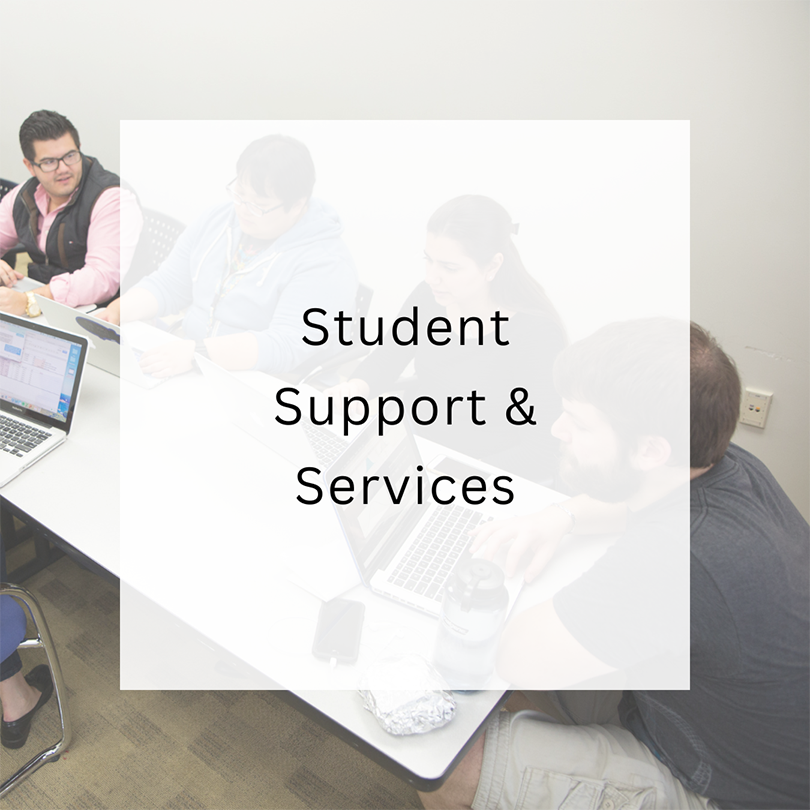Biomedical Sciences Master's Program
School of Graduate Studies
Join us in Fall 2026: Application materials | Application instructions
Request the recording of our most recent open house

Program at a glance:
| Number of credits | Duration | Course Delivery |
|---|---|---|
| 30 | 12 - 24 months | Online and On-site in Newark, NJ |
Admission quick facts:
Graduate Program Tracks and Degree Types
Graduate students in the Master's program are part of one of the following tracks: Medical scholars track for pre-medical students, Dental scholars track for pre-dental students, or Biomedical Research scholars track for students interested in biomedical research. Students in each track receive personalized advisement that helps them enhance their academic record and prepare for their post-graduation career. Students from all three tracks graduate with either a thesis-based Master of Science (MS) or a non-thesis Master of Biomedical Science (MBS) degree. Students have the flexibility to switch between MS and MBS. Graduates from this Master’s program pursue Medical School, Dental School, Ph.D. education or careers in the biopharma industry.
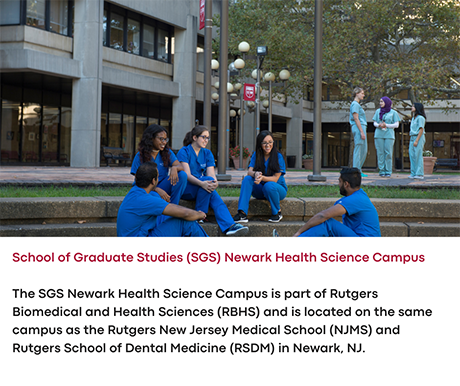
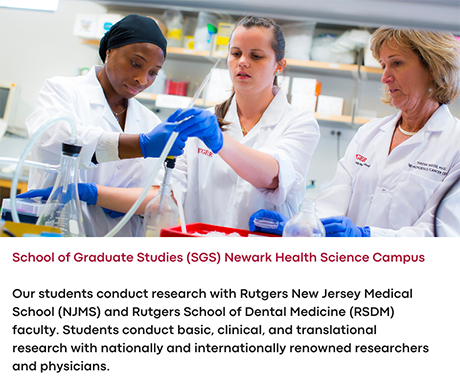
Faculty
Our faculty have appointments in SGS and primary appointments in NJMS or RSDM. Our Master's courses are developed by and taught by faculty who also teach in NJMS and RSDM. Feedback from our alums indicates that these courses prepare students for the rigor of professional school and Ph.D. programs. Our students also have the opportunity to engage in a 2-credit research rotation or a 5-credit Master's thesis with faculty in NJMS or RSDM. The 5-credit Master's thesis contributes to the 21 credits of elective coursework.
Medical Scholars Track
Our location on the campus of Rutgers New Jersey Medical School (NJMS) offers our students unparalleled opportunities. Here, they can connect with esteemed NJMS faculty and gain valuable insights from their expertise. Additionally, students can actively participate in meaningful volunteer activities at NJMS and University Hospital in Newark, NJ, enriching their education and community involvement. Pre-medical students enrolled in the Medical Scholars Track receive personalized academic advisement from Dr. Lawrence Gaspers (gasperld@njms.rutgers.edu) or Dr. Mariana De Lorenzo (delorems@njms.rutgers.edu) every semester. Furthermore, students have the opportunity to engage in tailored admission consultations provided by the NJMS Admissions office, designed to align with their individual credentials. Starting in Spring 2025, The Princeton Review will offer an MCAT Preparation Course specifically designed to fit the academic schedules of our Master's students. Students in the Medical Scholars Track can also gain valuable clinical experience at the Student Family Health Care Center (SFHCC). This opportunity serves as a non-credit elective, and completion will be reflected on the official transcript. Additionally, students within this track may register for medical school courses with M1 medical students at NJMS. The following courses are available to Master's students, pending special permission from Dr. Gaspers: Genes & Molecules in Medicine (3 credits), Medical Biochemistry & Epidemiology (3 credits), Introduction to Physiology & Pharmacology (3 credits), and Medical Hematology/Oncology & Immunology (4 credits).
Learn more including information about Guaranteed Interview at Rutgers NJMS
Dental Scholars Track
Pre-dental students in the Dental Scholars Track receive advisement from Dr. Vincent K. Tsiagbe or Dr. Carla Cugini or Dr. Daniel Kadouri. Students in this track can register for dental school courses taught in Rutgers School of Dental Medicine (RSDM). Oral Microbiology (3 credits) and Oral Immunology (3 credits) are dental school courses open to all students. Dental Histology (5 credits), Dental Neuroscience (4 credits), Dental Physiology (5 credits) and Dental Biochemistry (4 credits) are open to Master's students with special permission from Dr. Tsiagbe. All students receive one-one-one academic advisement every semester. In addition, students can also receive Admission consultations tailored to their credentials from the RSDM Admissions office.
Learn more including information about Guaranteed Interview at RSDM

Biomedical Research Scholars Track
In this track students can immerse in hands-on biomedical research and learn cutting edge research. The track prepares students to pursue a fulfilling career in biopharma industry or to continue training through Ph.D. programs. Many graduates from the Master’s program have gained admission into the Multidisciplinary Ph.D. program. Students also engage in many networking and career development activities with biopharma industry professionals. All activities are structured by the track director, Dr. Doreen Badheka. Dr. Badheka advises all student one-on-one to help them achieve their academic and professional goals.
Learn more including alumni outcomes

-
Coursework and concentrations
Required Coursework (9 credits)
This is a 30-credit Master’s program. Of the 30 credits, 9 credits are required courses and the remaining 21 credits are electives. All master's students must take:
1. Seminar in Biomedical Sciences (1 credit) or Oral Biology Research Seminar (1 credit).
2. Research in Biomedical Sciences, also called Masters Research Rotations (2 credits). Students who have previous research experience can request an exemption from this requirement, fulfilling the 2 credits with another course. For students who are remote there is an option of a literature review.
3. Any two of the following four 3 credit courses:- • Fundamentals of Pharmacology (Fall), Mondays, 6:00 to 9:00 PM
- • Fundamentals in Biomedical Sciences, Biochemistry (Fall), Tuesdays, 6:00 to 9:00 PM
- • Fundamentals in Biomedical Sciences B, Cell Biology (Spring), Wednesdays, 6:00 to 9:00 PM
- • Fundamentals of Human Physiology (Spring), Mondays, 2:00 to 5:00 PM
Elective Coursework (21 credits)
In this 30-credit Master’s program, 21 credits are elective courses. This flexibility enables the students to pursue courses that complement their strengths and fulfill their career goals. For example, students can take courses such as Cell Death, Cell Pathology, Gene Expression, Clinical Implications of Human Poisoning (taught by NJMS Emergency Department physicians), Basic Histology, Cancer Stem Cells, Principles of Clinical & Translational Research in Oncology, Regional Gross Anatomy (taught with cadaver dissections), Medical Nutrition and Disease, Methods in Microscopic Imaging, Pharmacology and Pharmaceutical Marketing, The Business of Science: Drug Discovery from Molecule to Medicines, Chemical Properties & Structures of Dental Materials, Bacteriology and Oral Infectious Diseases, Introduction to Genomics, Proteomics, and Bioinformatics and many more. In addition, if students enroll in courses taught in Rutgers New Jersey Medical School (NJMS) or Rutgers School of Dental Medicine (RSDM) listed below, credits from these courses also contribute to the 21 credits.Credit transfer from a professional school
If the student gains admission into a professional school, students have the option to transfer back 6 credits from the first year of their professional school. These six credits will contribute towards the 21 credits of electives. Students must seek advisement if they plan to pursue this option.
Concentrations
Four optional Academic Concentrations are available within the Master’s program: Neuroscience, Oral Biology, Pharmacological Sciences, and Stem Cell Biology. All students must complete the required course(s) and elective courses for a minimum of 8 credits. The courses are listed on each concentration’s website. The courses taken under these concentrations contribute to 21 credits of electives.
-
Program flexibility and duration
2-semester system and block schedule
In this Master’s program, we have two semesters. The fall semester begins in August and ends in December. The spring semester starts in January and ends in September. In each semester, some courses last for 3.5 to 4 months, and other courses last for 1 to 2 months. This block schedule enables the students to create a staggered schedule which helps them study better and have a strong GPA. During the spring semester, the months of May, June, July, and August are typically light, and students use this time to engage in Master’s thesis research or prepare for MCAT/DAT. During both semesters, most courses are offered in the evenings and have a remote option.
Learn more through our fall and spring semester schedules.Program duration
Students enrolled in this Master's program work on a path tailored to their personal and professional goals. The program duration varies depending on the students' needs. A typical pre-health student who comes to the program to strengthen both GPA and MCAT/DAT completes the program in 1.5 years. A pre-health student who comes into the program with a strong MCAT or DAT can complete the program in 1 year. A student interested in strengthening their biomedical research or applying to Ph.D. programs is recommended to pursue the 5-credit Master's thesis and may complete the program in 4 semesters (24 months). All students receive one-on-one advisement during or after orientation so they can make an informed decision.
-
Tuition and Financial Aid
Tuition
In this program, students are billed by credits and not by semester. Thus students are only responsible for the number of credits they register for. Students can register for as little as one course per semester. Students who are working full-time often alternate between part-time and full-time student status. During the 2023-24 academic year, tuition for full and part-time NJ Resident students was $ 1005.00 per credit and tuition for full and part-time Non-NJ Resident students was $ 1,299.00 per credit. Please visit this page for detailed Tuition and Fees information.Financial aid
Free Application for Federal Student Aid (FAFSA) is available. To learn more about FAFSA, visit the Rutgers Financial Aid website and expand the Rutgers Biomedical and Health Sciences accordion. Under this accordion, you will find us listed as the School of Graduate Studies – RBHS Newark. For the cost of attendance, expand the BIOMEDICAL SCIENCES – MASTERS accordion on this page of the Rutgers Financial Aid website.On-campus employment and volunteering
Graduate students often find on-campus employment in research laboratories through the faculty or the Rutgers Jobs website or the Job Location and Development Program (JLDP). Students can also reach out to faculty for TA positions. Students also find employment or volunteering opportunities in the University Hospital on our campus. Our students often volunteer as case managers in the Student Family Health Care Center (SFHCC), as peer tutors, and as mentors in Project Beam. Many more volunteering opportunities are available through the pre-medical and pre-dental societies.Leadership opportunities
Graduate students have many opportunities to lead student initiatives through the Graduate Student Association (GSA) and many other student organizations. All student organizations have strong support from a faculty advisor and the SGS Newark Health Science Campus administration.
Learn more
| GRE / MCAT / DAT test scores | Rolling Admissions | Application Deadlines |
|---|---|---|
| Optional | Yes | Application Deadline for Domestic Students Application Deadline for International Students |
More questions?
Below you will find more helpful pages. Applications are currently open and admission is offered on a rolling basis. The program is also open to international students. We request international students to read all the information related to requirements for international students and apply early to give enough time for F1-visa related processes. The Rutgers Global office provides support to our students for Optional Practical Training (OPT) application and STEM OPT extension.
Learn more about OPT

